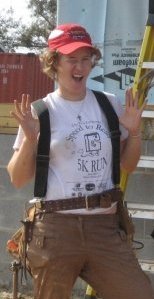

Thursday was the 'grand opening' of Project SpafeSpace, a new initiative of The Big P, which serves as "a place of welcome for anyone looking for a community of acceptance, a ministry of spiritual wellness & human dignity, or a chance to be in transformational relationship with others." Project SafeSpace offers "case management, laundry facilities and a shower, and communal Bible study with food (Wednesdays at 5pm)."
It is the culmination of months of envisioning, planning, and faithful response to the call felt by the social justice warriors at this non-profit to "care for the least of these." In a timely selection of scripture, Sally, my boss, preached last Sunday on Matthew 25 and the imperative on each of us to show compassion for the sick, visit the imprisoned, give food to the hungry, drink to the thirsty, and clothing to the "nekkid" (yes, "nekkid"--she's a Mississippian). The Scripture says the ill, the felons, the starving, the parched, and the people wearing the same rancid clothes for weeks because they have nothing else to put on are all Jesus Christ. (This poses an interesting theological question--are "the least of these" metaphorically Christ-like because they are suffering as Christ did on earth? Or are they literally Jesus? Separately, I feel uncomfortable thinking we should feel obligated to serve them only because they are Jesus-on-earth, and not simply because they are our brothers and sisters in need.) Sally talked about how it may be easy to volunteer once a month stocking shelves at the local food pantry, or to visit your neighbor who's in the hospital following surgery; but we are equally called to see Christ in the drunk, toothless man accosting us for change; in the child rapist serving 25 years at Parchman; in the hospice patient who got AIDS from unsafe sex or drug use; and in the "crazy" missionary Sandra Kay who came testifying of the miracles she'd seen and asking an already poor non-profit--us--for money. We're called to see Christ in the truly least of the "least," and to serve accordingly. Jesus hung out with the dregs of society, those who were a world away from living righteously--not just those "deserving" of help. (This is where part of the "cost" of "the cost and joy of discipleship," one of my favorite lines in the UCC statement of faith, kicks in.) More on this in another post.
Our non-profit's commitment to living out this challenge is how I found myself kneeling at the feet of Miss Roxanne, unwinding the bandages that covered the oozing, greenish hole where the screws in her ankle protruded from the still unhealed skin. An alcoholic with a history of dope usage, Miss Roxanne had fallen through the floor of an abandoned Katrina house where she'd been staying; the plates and screws in her foot are the only thing holding the ankle joint together. To accomplish the major feat of walking, she requires the support of a cumbersome plastic brace and a collapsible walker; even with these aids, her steps are slow and difficult. As you might imagine, she's jobless, but she can't begin to receive disability payments until she weans herself off of her drug & alcohol addictions, a near-impossible feat without the help of expensive detox pills. Likewise, the drug rehab program we have her signed up for will not even enroll her until her system is clean of narcotics (oh, the irony), a process which takes about 3 weeks and the effects of which she can't face without the constant presence of a $2.90 bottle of vodka or a 40 of cheap beer. As for how she came to this point in life, as to why her face bears the battle scars of seven or eight decades' worth of life at the robust age of 43--well, even if you only believed half the stories she tells you, she's still seen and done and been through much more than the average person's share of misfortune, bad decisions, and horrific abuse.
Miss Roxanne was our very first community member at Project SafeSpace (they're not "guests" because this is their community, their place to feel at home). This is a status she wants memorialized with an employee of the month-style bulletin board display. Bitter tears squeeze from her eyes when she describes how the director of the local soup kitchen called the rehab place to warn them not to admit her; her hoarse, gap-toothed laugh rings out with cheery calls of "Hey sugarbunch!" to staff members she recognizes. As I brush through her matted shoulder-length hair so she won't "scare nobody lookin' like a crazy person" when she goes outside for a smoke, she tells me how it used to hang down the middle of her back, silky-smooth. It lost its supple sheen when she let her daughter, who's just about my age and who lives across the bay, convince her to dye it peroxide blonde. I don't know what their relationship is like, although Roxanne claims to have cut off ties with most of her family so they won't "see me like this." She's so far removed from regular society, so invisible, that an old friend she ran into a few months ago told her he'd just seen her obituary run in the paper.
After she's done washing, Roxanne hollers at the top of her lungs for me to come help her out of the shower and put clean gauze on her foot. The screw bits stick out of her flesh, the metal plate distorting the regular shape of her ankle into a boxy, unnaturally wide deformity. As I roll her kelly green athletic socks back onto her damaged legs, the stench of unwashed clothing fills my nostrils, and I think about Jesus washing the disciples' feet. The next day I help her pick through the few dry belongings left in the collapsed tent she used to live in, swatting at the mosquitoes and sweating in my office clothes as she instructs me from the car as to what should be salvaged from the shambles of her life. The owner of the neglected lot where she was squatting pulled up the stakes and crumpled up the tent so she couldn't sleep there anymore, so I'm driving her over to a burnt-out shell of a house where she'll bunk in a 2-man tent with a few homeless men she knows. In an absurd parallel of dinner-party etiquette, she's got her heart set on buying them a 40 of Steel Reserve as a sort of hostess gift for letting her crash their makeshift digs, but she's misplaced her last two dollars and can't afford to buy the beer--"Honey, you better frisk me for 'em, they've gotta be here somewhere," she tells me. The funny thing is, I'd do the same thing--I've been brought up to show gratitude for others' hospitality, and under the circumstances, beer is really the only thing her friends would want; but as an employee of a faith-based organization, I have to tell her I don't feel comfortable spotting her the $2 for the alcohol. Water or soda won't do, so I drive her back, empty-handed, to the blackened house and help her get settled on the concrete slab next to her friends' tent.
Now here's a question that's both metaphorical and literal: What do you give Jesus to drink when he's a homeless alcoholic trying to maintain a little dignity and show some gratitude for life's blessings, however meager?
Just tryin' to figure out how best to make good on our own invitation: "Come lay your burdens down and share the journey with us at Project SafeSpace!"




